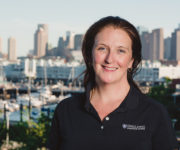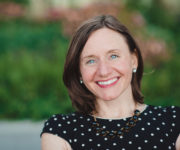Meet the Match
A Russian Wheelchair Fencer on a Mission for Inclusion
Ksenia Ovsyannikova was still undergoing rehabilitation when a wheelchair fencing trainer contacted her university in search of athletes for her team. At the age of 16, Ksenia had suffered a neck injury in a diving accident. Before the injury, she did not consider herself an athlete, but something motivated her to show up to the first practice.
“I was actually the first student at practice,” Ksenia recalls. “I didn’t know anything about wheelchair fencing then. Years later, I’m a national champion and a leader in the federation. This was clearly my destiny.”
Born to a small family in Moscow, Ksenia was partly raised in Mozambique, where her doctor father moved the family in order to a work in a hospital following the country’s civil war. After she returned to Russia, she completed a diploma in linguistics from Moscow State Social Humanitarian Institute and a master’s degree in international relations in 2011.
By this time, Ksenia was already a Russian champion in wheelchair fencing. Since 2008, she has won multiple Russian, European, and World championships in sabre, foil, and epee. Her most recent win was at the 2016 European Championships.
“In wheelchair fencing, you don’t fight with distance or time, you fight with an opponent,” Ksenia says. “The fight is like a conversation. If you have a strong opponent, they will also make you strong. After the fight, we become friends. Through this sport we can have friendships all over the world.”
Outside of competing, Ksenia works as the executive secretary of international relations for the Wheelchair Fencing Federation of Russia. In this role, she is responsible for coordinating international activities, organizing logistics and travel, and serving as team manager at major competitions. She is also licensed as an international referee in epee and sabre.
“The sport has given me another family,” Ksenia says. “My team became my family. I know all of my athletes and I support them. When someone loses their fight, we cry together. If they win, we sing our national anthem all together. This is a big emotional part of my life. It makes me very proud.”
At the IWAS Wheelchair Fencing Sport Assembly in Italy last November, Ksenia was appointed to work in international promotion and development of wheelchair fencing. She is specifically tasked with increasing the athlete pool for category C— a classification for athletes with disabilities in all four limbs. According to Ksenia, there are very few women compete in this category, and she is driven to increase recruitment at home in Russia and abroad.
In Russia, athletes with disabilities face challenges due to inaccessibility of facilities and transportation. Similarly, heavy snowfall in the winter can prevent wheelchair users from traveling easily. In addition to physical barriers, societal perceptions result in some parents of children with disabilities keeping them out of sports.
Ksenia is determined to change the perception of disability and expand the adaptive sports movement by increasing athlete recruitment in Russia’s hospitals and rehabilitation centers. She also hopes to launch special sports festivals, where she and her team will lead inclusive clinics that teach children how to fence using plastic swords while also integrating participants without disabilities.
“I want to show that disabled people can do almost anything that everyone else can do,” Ksenia says. “We just need to understand each other’s’ situations. We start with the children.”
For her mentorship experience, Ksenia was partnered with two dynamic female leaders at Spaulding Rehabilitation Network, a top U.S. organization in the fields of rehabilitation, therapeutic recreation, and adaptive sports. For more than a decade, Mary Patstone, director of adaptive sports and recreation, and Dr. Cheri Blauwet, attending physician, chairperson of the IPC Medical Committee, and seven-time Paralympic medalist, have worked in adaptive sports programming from the grassroots to Paralympic level. Both Mary and Dr. Cheri possess a comprehensive knowledge of how to build successful programs that positively impact communities locally and nationally. At Spaulding, Ksenia will was in an ideal environment to meet her program goals, including how to develop volunteer networks and organize sports events that place an empowering spotlight on disability sport in Moscow and beyond.


